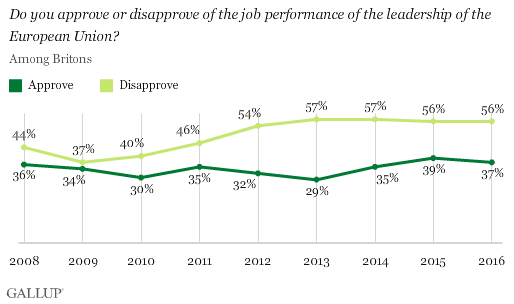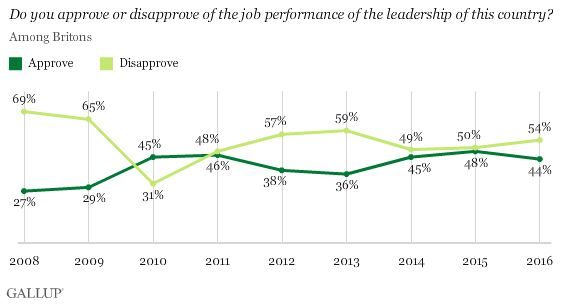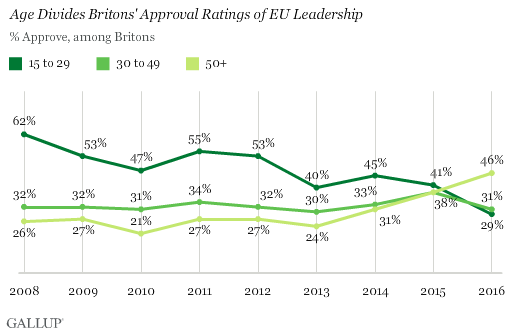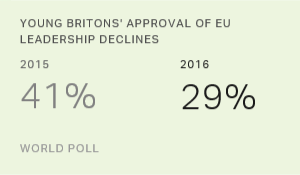Story Highlights
- 37% of Britons approve of EU leadership
- Nearly half of Britons aged 50 or older, 46%, approve of EU leadership
- Approval is far lower among youngest Britons, 29%
WASHINGTON, D.C. -- Britons cast their votes in a referendum Thursday that will determine whether the United Kingdom stays in the European Union. While recent reports suggest the "Brexit" vote will be too close to call, Gallup in February and March found firm majority disapproval of the EU's leadership among Britons. Fewer than four in 10 Britons (37%) approved of the EU's leadership at the time -- consistent with Britons' dismal approval ratings for almost a decade.

The U.K. cast its economic lot with Europe in 1973 when it joined the European Economic Community, the forerunner of the EU. Britons' approval ratings of the EU's leadership have been consistently lackluster since 2008, when Gallup started asking them this question, ranging between 29% and 39%. But notably, Britons' ratings of their own country's leadership have not been high over the same period. In fact, at several times, their ratings of their own leadership were marginally lower than their ratings of the EU -- including in the years leading up to the 2010 election that resulted in the Labour Party losing majority control. Since then, Britons' ratings of their own leadership have been somewhat higher than those of the EU's leadership.

However, what looks to be a fairly stable trend in EU leadership approval masks a sharp contrast between views of younger and older Britons. While leadership approval of the EU was highest among those aged 15 to 29 in 2008, at 62%, it has declined since, dropping to a low of 29% in 2016. At the same time, the typically lower approval among Britons aged 50 and older began inching up in 2014, and now nearly half (46%) in this age group approve of the EU's leadership.

Bottom Line
Britons hold deep-seated opinions on both sides of the Brexit issue. Those likely voting to leave the EU believe it would free Britain from EU regulations and stimulate economic expansion -- and result in far fewer migrants making their way to its shores. Among those with the contrary view, many fear that leaving the bloc could roil global economic markets, harm trade with Europe and lessen British productivity and incomes. It remains to be seen if or how last week's murder of a young, pro-EU member of British Parliament, Jo Cox, affects national sentiment on this critical vote about Britain's future, although some weekend U.K. polls find an uptick in "stay" votes. If Britons vote to stay, the country's leaders must still acknowledge and contend with the strong undercurrent of disapproval of the bloc's leadership that paved the way to Thursday's vote.
Historical data are available in Gallup Analytics.
Survey Methods
Results are based on telephone interviews with 1,000 adults, aged 15 and older, conducted Feb. 19-March 16, 2016, in the United Kingdom. For results based on the total sample of national adults, the margin of sampling error is ±3.6 percentage points at the 95% confidence level. The margin of error reflects the influence of data weighting.
For more complete methodology and specific survey dates, please review Gallup's Country Data Set details.
Learn more about how the Gallup World Poll works.

